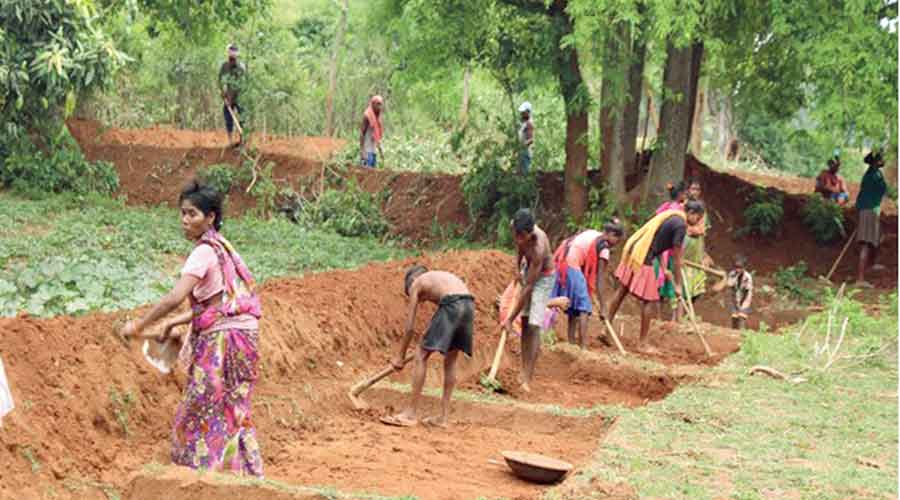The Centre is running the rural employment guarantee programme as if it is a compulsion without recognizing its enormous potential to deal with the ongoing rural economic crisis. Numerous civil society organizations and social activists have urged the Centre to run it in accordance with the true spirit of the National Rural Employment Guarantee Act and not merely as a government scheme. Yet, successive Central governments have approached the NREGA half-heartedly, diluting the possibility of rural employment generation.
The NREGA was envisaged to ensure employment generation in rural India and to make sure that the rural workforce contributes towards building assets and infrastructure to boost livelihood opportunities. However, since its inception, the discourse on the NREGA has shifted to the debate on asset creation versus employment generation. An asset-centric focus helps the bureaucracy. The government can also shrug off its responsibility towards protecting workers’ rights. Consequently, the idea of public investment to create rural job opportunities has taken a blow, limiting the NREGA to a scheme-based, supply-driven programme. The NREGA machinery must act efficiently if assets are to be created and sustained in the long term.
There has hardly been any value addition in the last 15 years in terms of strengthening the programme to offer rural citizens adequate employment and a dignified income. The NREGA’s mandate is to plan and implement schemes in a decentralized manner, honouring traditional knowledge and participatory decision-making. However, it has been centralized and bureaucratic control over the programme has demolished the spirit of a public, demand-based, employment-guarantee programme. Workers are routinely denied work and unemployment allowances are seldom paid to eligible candidates. This has led to the genesis of a contractor-led system, defeating the very idea of guaranteed employment against demand. The need for and benefits of the programme are unquestionable. But poor implementation and policy inertia have led to stagnation.
The government has projected the NREGA to be an asset-creation machine. The focus on the technicalities of asset creation by non-profit entities has also deflected attention from workers’ rights even though workers are not paid on time, work applications do not receive timely allocation and worksite facilities are made unavailable. The ‘convergence’ efforts by the government have also weakened the programme’s foundation: the NREGA has been integrated with a number of other schemes, reducing the scope of additional income. Convergence works best when it aims to create different assets for a specific set of households. Inter-departmental convergence in the NREGA’s case results in the violation of the Act since most other schemes run on a contractor-based delivery mode.
The target-based focus on asset-generation is leading to further damage. Nowadays, even budget allocations are made based on the number of targeted assets in different states. The irony is that the quality of assets has not improved in the absence of robust monitoring and grievance redress strategies. In fact, the asset-centric focus is a cleverly crafted strategy by the bureaucracy to ignore workers’ rights and turn the NREGA into a target-driven programme that is easy to control without being accountable for the gross violations of the law.
The key issues — inadequate allocations, centralized payments, long delays in wage payments and non-payment of wages — have been brushed aside even though they have damaged the NREGA. The NREGA wage rates are ridiculously low. In most states, they are even lower than those of the agricultural minimum wage.
The pandemic has underscored the importance of the NREGA in generating employment in rural India. Instead of an asset-centric approach, the Centre should encourage proper budget allocations, dignified wages and their timely payment, decentralized planning as well as social audits to promote transparency and accountability of the local administration.
Debmalya Nandy is associated with NREGA Sangharsh Morcha and has worked with the tribal population of Jharkhand and Odisha for a long time











